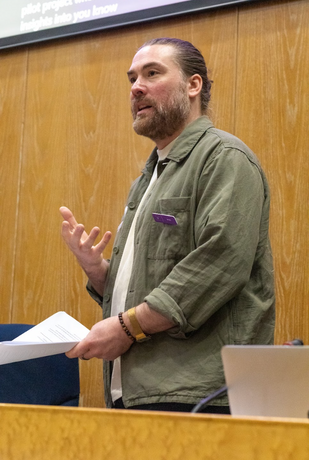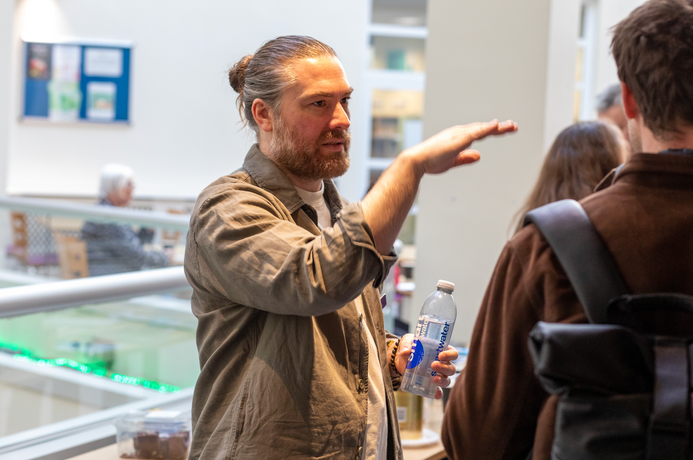
Exploring Healthy Masculinity
in Merton
In March 2025, we hosted Exploring Healthy Masculinity in Merton in partnership with Safer Merton, bringing together teachers, parents, and advocates for an open and productive conversation about how we can support boys in developing positive, healthy identities.
We welcomed over 70 attendees to the event, which featured a talk from our co-founder Jack Tricker and lead facilitator Will Hudson, a Q&A with the core Voicebox team, and opening and closing remarks from Councillor Edith Macauley MBE and Councillor Usaama Kaweesa.
The event was a culmination of our work done earlier in 2025 and 2024 in primary schools, secondary schools and youth centres in the London Borough of Merton. It unpacked our findings (positive and negative) and, with input from our attendees, informed our next steps in continuing promoting healthy masculinity with young people.
Catch up with the talk and our Riverside Radio feature, hear our answers to live-stream attendees' questions, and download free resources below.
What did Riverside Radio want
to know?
Evie Calver and Mirrhyn Stephen chatted with our co-founders Jack and Andy as well as London Borough of Merton's Councillor Usaama Kaweesa about the concept of healthy masculinity, Voicebox's work and positive role models. Watch a clip below or listen to the full feature here.
What did our live-stream audience want to know?
We couldn't get around to answering everyone's question during the event itself (too much to say - not enough time!). So as promised, we made sure to get them answered here:
"Unclear where harmful traits of masculinity (aggression, violence) intersects with adultfication of black boys. Is there not a risk of stigmatising black boys who are already treated/ viewed as "hyper-masculine" compared to their non-black peers in discussions around masculinity. They already operate under a microscope."
Click play to hear Jack's answer or read the transcript:
Hi there! Thanks for your question. So rather than focusing on harmful traits, we at Voicebox take positive and empowering approach by promoting these alternative models of masculinity. So through that, we empathise healthy expressions of masculinity that encourage vulnerability, self expression and emotional intelligence. And this approach ensures that black boys are not unfairly treated, but are instead supported in embracing a very well rounded sense of identity. We then look at engaging black boys specifically in this conversation. So instead of making assumptions about their experiences, we actively involve black boys in shaping these discussions. Their voices are central to the narrative. So we have to ensure that the conversations about masculinity are reflective of their realities and of their needs. Thanks for coming. Appreciate your support.
"This has been really interesting, informative and motivating, thank you. I work in Portsmouth childrens social care, and has made me think how this also could be adapted for direct work with children who are victim of domestic abuse from parental behaviours. There is little support for the long term impact, and I think this topic of work could be very beneficial."
Click play to hear Andy's answer or read the transcript:
Hi. Thank you so much for your question. I think you're absolutely right that our work around healthy masculinity could really benefit young people who’ve experienced domestic abuse in the home. I think for some of these young people like their experience of masculinity and what it means to be a man can be quite unhealthy. And so I think it's really important that we yeah, look at doing work with these young boys, around kind of what masculinity is and what, what positive masculinity could look like. And I think that can really help them develop a really positive vision of what it could mean to be a man, and really kind of go against potentially some of those examples of masculinity that they are potentially seeing in the home. So, yeah. Thank you so much for your question on that.
"I wonder if and when there has been split gender groups, the follow up session could be mixed, also allowing to see how embedded the learning has been."
Click play to hear Jack's answer or read the transcript:
Hi, there. Yeah, thanks for your, for your question. Yeah. So our work on healthy masculinity fits into this really, really well. When we have run split gender sessions in the past, boys and girls get the chance to talk, you know, openly in a space where they feel most comfortable. But also, you know, the mixed followed mixed gender sessions that we run as well are really powerful because it brings everybody into the, into the conversation and allows them all to apply what they've learned into real life settings. And yeah, bringing everybody into that conversation. We're now testing this long term with some healthy masculinity and healthy femininity leaders programmes. But yeah, a really good suggestion. So thank you very much.
Want to know more?
Download our free resources
Download the slides and transcript of the event, and keep an eye out for our free toolkit: Strategies for Gender-informed Work in Youth Settings - coming soon!
If you've got an idea for a project and are interested in running one with us,
get in touch with Jack at jack@voiceboxcic.com













